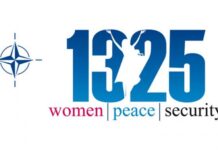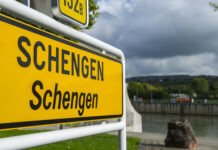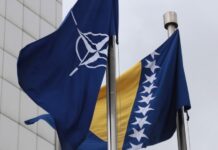What do young people in Republika Srpska think about NATO?
Despite of the official foreign policy of BiH clearly favoring NATO membership, which very clearly goes towards NATO membership, the public is still wary. This is, especially particularly so in the Republika Srpska still shows the lack of trust.
We The Atlantic Initiative conducted a small poll to asking the young people in Banja Luka and East Sarajevo what they really think thought about the possible membership accession of our country joining into NATO. It The results seem to indicates thatan with the increased exchange of informationawareness about the Alliance, . Consequently, some rigidrigidly held positions are slowly softening, at least amongst this the younger generation.
Pro at Contra
Giving significance to the cultural inheritance in of BiH, a student of at the Law Faculty in Banja Luka, Aleksandar Jokić, is skeptical talks about Euro-Atlantic integration in a very skeptical way. He showsHis primary concern is for our marketeconomy upon entering and integrating with the EU, and proposess cooperation only in the form of partnership. He considers s NATO as the only military alliance in the world, points out the controversy of Article 5, even lists the instruments of the US invasion attacks, in which he includes NATO. In sociological sense he saysSociologically speaking, he argues that the structure of BiH is has not changedremained the same: “people have not changed, politicians have changed.” Aleksandar’s expressesexpressed concern and rejection his concern and denial of NATO because ofis based upon its – as he says – exclusively militaristic character.
Ivana Malarić, a student of in the Faculty of Political Sciences of of Banja Luka, gives her own opinion ofn NATO: “It seems to me that mainly the USA and the Great Britain demand that BiH should join NATO because of the Balkan black market route, security in the area, etc; it will also be a kind of preparation for developing security before joining the EU. Also, it seems to me that the issue of sovereignty of BiH (because of the existence of OHR) is raised very often. And with its accession to NATO, the country could be equal on the issue to other countries one day, or at least develop in that direction. In my opinion, Bosnia and Herzegovina needs a defined foreign policy. The only solution is to turn to Euro-Atlantism, because all the Balkan countries are going in that direction. That is why the term Balkan as something negative is not used: instead, the term South-Eastern Europe is used. Due to the weak consensus in BiH, cooperation on European policy is needed, and the unitary BiH has to be preserved because a better economic standard should emerge upon accession to NATO at the very least.”
Maja Šarović, a student of the Faculty of Economics in East Sarajevo, expresses a negative opinion regarding BiH accession to NATO, and especially emphasizes the position of small states in such alliances, as well as the consequences of choosing NATO, affecting itsn relationss to with other countries that are not full members.
A graduate student at in the Law Faculty, Zoran Jaćimović, expresses an affirmative opinion on of BiH accession into NATO, because he thinks that being neutral would not be good, that “the spear would break on us again”, and that this is the only way for BiH to survive, when everybody around us becomes a NATO member.
Milica Karadža, a student of Faculty of Philosophy in Banja Luka, defines the Alliance as a successor of old bloc division that is, only in a new outfit. She considers the BiH accession to NATO as a defeat and as a creation ofthat it would create the potential for another war. She condemns the slogan, “if some are at war then all are at war.” She says that there is a civil sector within NATO, yet it only exists in theory.
Maja Vladenović, a senior student at the Faculty of Economics, says that for BiH, accession to NATO means a step forward, a move towards the better and towards achieving stability as well as economic safetysecurity.
Marko Močević, a student of the Law Faculty in East Sarajevo, also disagrees with the accession of BiH to NATO, because he does not think that the Alliance provides enough security to all its member countries. He also points out the unequal geopolitical status of the countries in transition, including BiH. He is completely convinced that security in BiH is guaranteed without the accession into NATO, because there is no real threat of new conflicts.
Ivana Pavlović, also a student at this faculty adds that BiH does not need a foreign protector or mentor, 15 years after the war ended.
Vanja Stefanovski, a student of the Medical Faculty has a negative opinion on accession to NATO: he considers the membership in the Alliance expensive because of it requires the purchase of new weapons. He also expresses his concern that BiH might become a terrorist target.
Different System of Values
Igor Gavrić, a student at the Faculty of Political Sciences, considers NATO to be a military alliance for the preservation of stability. maintenance and He says that BiH should join NATO because of the differences between its ethnic groups; he considers NATO as the only guarantee that “the old story does not repeat.” He says argues that neutrality is possible only for thosee countries without war historywho do not have a history of war. In addition to benefits like a professional army, Igor thinks that we simply do not have any other option.
Dijana Petrović, a student of Dental Studies, says that the foreign policy of BiH should be turned towards the USA because it emphasizes the interests of a small state through he Alliance. For As far as joining NATO is concerned, she says that it might not help BiH that much.
Vedran Stanišić, a student of the Faculty of Mechanical Engineering, says that it is time for BiH to turn to a different system of values: to learn the Western rationalism partly for our own sake. We should turn to European policy and NATO in order to achieve stability and start dealing withfocusing upon the development of the state, primarily in economic field.
Dejan Sajinović, journalist for Nezavisne Novine in Banja Luka, says that the issue of NATO is especially sensitive for the Serb people. However, he points out that if there it had not been for the NATO intervention, the Dayton Agreement would not have been signed. Thus, the Republika Srpska would not have been recognized internationally as one of the entities of BiH. Supporting the BiH accession to NATO, Dejan points out the democratic organization of this Alliance and explains the reasons of for the success of the Alliance in the following way: “You do not have to be a NATO member to function perfectly within NATO. One example is the “Active Endeavor” action, in which Russia takes part as well. It has its military contingent, and NATO treats it in the same way as any other military contingent: NATO uses its tactical organizational capacities so that this colorful structure of various armies could act as one compact entity, regardless if they are members or not. One similar situation is in the ISAF Operation in Afghanistan, in which many countries that are not NATO members, including BiH, participate. And there is also a good example in our country. We have European Stabilization Forces, EUFOR, which essentially use organizational tactical capacities of NATO. The operation in BiH is in fact a NATO-style operation.”
Text: Jelena MOČEVIĆ andi Milena AĆIMOVAC







